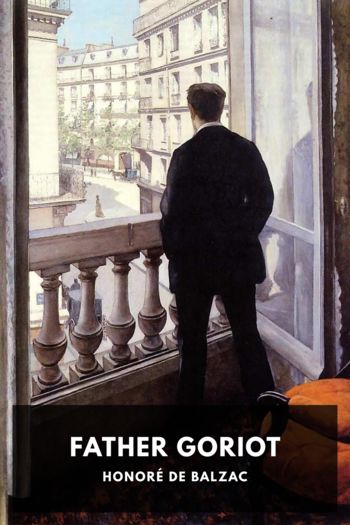Father Goriot - Honoré de Balzac (fantasy novels to read .txt) 📗

- Author: Honoré de Balzac
Book online «Father Goriot - Honoré de Balzac (fantasy novels to read .txt) 📗». Author Honoré de Balzac
For three months from that day Mme. Veuve Vauquer availed herself of the services of M. Goriot’s coiffeur, and went to some expense over her toilette, expense justifiable on the ground that she owed it to herself and her establishment to pay some attention to appearances when such highly-respectable persons honored her house with their presence. She expended no small amount of ingenuity in a sort of weeding process of her lodgers, announcing her intention of receiving henceforward none but people who were in every way select. If a stranger presented himself, she let him know that M. Goriot, one of the best known and most highly-respected merchants in Paris, had singled out her boardinghouse for a residence. She drew up a prospectus headed Maison Vauquer, in which it was asserted that hers was “one of the oldest and most highly recommended boardinghouses in the Latin Quarter.” “From the windows of the house,” thus ran the prospectus, “there is a charming view of the Vallée des Gobelins (so there is—from the third floor), and a beautiful garden, extending down to an avenue of lindens at the further end.” Mention was made of the bracing air of the place and its quiet situation.
It was this prospectus that attracted Mme. la Comtesse de l’Ambermesnil, a widow of six and thirty, who was awaiting the final settlement of her husband’s affairs, and of another matter regarding a pension due to her as the wife of a general who had died “on the field of battle.” On this Mme. Vauquer saw to her table, lighted a fire daily in the sitting-room for nearly six months, and kept the promise of her prospectus, even going to some expense to do so. And the Countess, on her side, addressed Mme. Vauquer as “my dear,” and promised her two more boarders, the Baronne de Vaumerland and the widow of a colonel, the late Comte de Picquoisie, who were about to leave a boardinghouse in the Marais, where the terms were higher than at the Maison Vauquer. Both these ladies, moreover, would be very well to do when the people at the War Office had come to an end of their formalities. “But Government departments are always so dilatory,” the lady added.
After dinner the two widows went together up to Mme. Vauquer’s room, and had a snug little chat over some cordial and various delicacies reserved for the mistress of the house. Mme. Vauquer’s ideas as to Goriot were cordially approved by Mme. de l’Ambermesnil; it was a capital notion, which for that matter she had guessed from the very first; in her opinion the vermicelli maker was an excellent man.
“Ah! my dear lady, such a well-preserved man of his age, as sound as my eyesight—a man who might make a woman happy!” said the widow.
The good-natured Countess turned to the subject of Mme. Vauquer’s dress, which was not in harmony with her projects. “You must put yourself on a war footing,” said she.
After much serious consideration the two widows went shopping together—they purchased a hat adorned with ostrich feathers and a cap at the Palais Royal, and the Countess took her friend to the Magasin de la Petite Jeannette, where they chose a dress and a scarf. Thus equipped for the campaign, the widow looked exactly like the prize animal hung out for a sign above an à la mode beef shop; but she herself was so much pleased with the improvement, as she considered it, in her appearance, that she felt that she lay under some obligation to the Countess; and, though by no means openhanded, she begged that lady to accept a hat that cost twenty francs. The fact was that she needed the Countess’ services on the delicate mission of sounding Goriot; the countess must sing her praises in his ears. Mme. de l’Ambermesnil lent herself very good-naturedly to this maneuver, began her operations, and succeeded in obtaining a private interview; but the overtures that she made, with a view to securing him for herself, were received with embarrassment, not to say a repulse. She left him, revolted by his coarseness.
“My angel,” said she to her dear friend, “you will make nothing of that man yonder. He is absurdly suspicious, and he is a mean curmudgeon, an idiot, a fool; you would never be happy with him.”
After what had passed between M. Goriot and Mme. de l’Ambermesnil, the Countess would no longer live under the same roof. She left the next day, forgot to pay for six months’ board,





Comments (0)